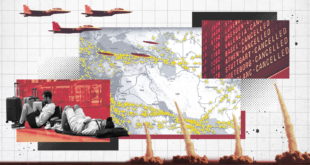OCCUPIED JERUSALEM — Israel has long pursued a policy of preemptive attack as its preferred form of defence. But when it comes to tackling arch-foe Iran, that option may have been put on hold under a protective “umbrella†on offer from the United States.
After years of speculation on whether Israel could launch unilateral strikes on the Iranian nuclear programme, some experts now see a major shift in the Jewish state’s strategy.
At the core of the change was a vow by US President George W. Bush, in a Reuters interview last week, to “rise to Israel’s defence†in the face of increasingly tough talk from Tehran.
Bush’s phrasing, with its overtones of Israeli dependency, departed from the language of past US pledges that focused on preserving Israel’s military superiority over Middle East foes.
Given US efforts to curb Iran’s nuclear plans through international diplomacy, experts say Israel will have to shelve any plans for region-rattling, go-it-alone missions like its 1981 bombing sortie against Iraq’s atomic reactor at Osiraq.
This thinking is bolstered by the Bush pledge’s echoes of cold war pacts — NATO in Europe, the “nuclear umbrella†over Japan — which defended US allies against the Soviets while obligating them to get Washington’s nod for any military moves.
“In political life there are no free lunches, and Bush’s statements have a price. They remove the possibility — if there ever was one — of Israel taking matters into its own hands,†wrote Aluf Benn, diplomatic correspondent for the influential Israeli newspaper Haaretz.
“The decision if and when to act against Iran will be made in the White House, not in the underground headquarters of the (Israeli military command) general staff.†A senior Israeli official, who asked not to be named, acknowledged that Bush’s pledge took bilateral ties to “a new level,†but said Israel had not promised anything in return.
Asked if Israel was considering military action on Iran, he said: “Our policy is to follow the US lead in this matter.†Iran says its nuclear programme is for energy, not arms.
According to Benn, the US deal has already ushered in a rhetorical restraint among Israeli officials who had previously refused to rule out an Osiraq-style operation against Iran. So guided, interim Prime Minister Ehud Olmert expunged mention of Iran from a recent major policy speech, Benn said.
Logic of limitation
Such reticence carries no great price for Israel, whose past veiled threats on Iran had rung hollow to many defence experts.
Unlike Saddam-era Iraq, Iran has numerous, dispersed and fortified nuclear sites — a challenge perhaps beyond the means of Israel’s military, and which only US forces could handle.
“This [Bush’s pledge] is a landmark bit of phrasing which I am sure was at least partly calculated,†said Patrick Cronin of the International Institute for Strategic Studies in London.
But he added that an agreement by Israel to forgo unilateral action on Iran “would not cost a lot, as while tactically [Israeli] military options are not nil, they are close to nil.â€
Weighed against such assessments are experts like David Ivry, the former Israeli air force chief who masterminded the Osiraq strike. He argues that even limited attacks on Iran’s nuclear programme could be enough to set it back by years.
“Launching such an action is a matter of Israel setting a `red line’ for when the threat posed by Iran is unbearable and, when it is crossed, giving the order,†Ivry said.
Asked whether, in light of Bush’s pledge, Israel would have to at least coordinate any military operation with its US ally, Ivry said he thought it unlikely. “Coordinating would mean, essentially, asking for permission,†he said. David Hartwell, editor of Jane’s Country Risk, disagreed.
“The strategic situation with today’s Iran is not what it was with Iraq in 1981,†he said. “US policy in the region would be seriously undermined by an independent Israeli action.†While he noted that the US-Israeli understandings had yet to be ratified like the defence pacts of the cold war, Hartwell saw them as similarly circumscribing future actions by Israel.
“The assumption is that the provision of a nuclear umbrella means you forgo a certain amount of defensive action,†he said.
Historical precedent suggests Israel could eventually, under an upgraded US alliance, come clean on an atomic arsenal it has never confirmed having, and even agree to limitations on it.
In the 1960s, France pursued a nuclear programme in part because President Charles De Gaulle said he did not want to rely on US protection from the Soviets. By submitting to a US umbrella, some see Israel being drawn in the opposite direction.
“Part of the American strategy now may be to provide a nuclear umbrella to the Israelis, with the hope being that, one day, they disarm,†Hartwell said. Israeli officials, while maintaining a policy of ambiguity over the country’s nuclear capabilities, have ruled out any open review of it in the absence of comprehensive Middle East peace.
Reuters
 Eurasia Press & News
Eurasia Press & News


